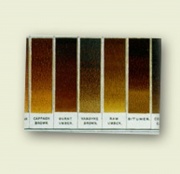Brown pigments
Revision as of 06:49, 24 July 2013 by (username removed)
Description
Brown is a low luminance color that is typically produced by adding black or their complementary colors to red, orange, or yellow paint. It is considered an earth tone and has an unlimited numbers of shades. An average brown color is represented by the following color coordinates:
- Hex triplet: # 964B00
- RGB: (150, 75, 0); CMYK (0, 50, 100, 41)
- HSV: (30°, 100%, 59%)
Examples of inorganic brown pigments:
- earth colors (iron oxide, ocher, umber, sienna)
- bituminous (Vandyke brown, mummy)
- other (Prussian brown, manganese brown, Mars brown)
Examples of organic brown pigments:
- animal (sepia)
- plant (bister, cutch, henna, nettle, logwood)
- synthetic (brown azo dyes)
Synonyms and Related Terms
brun (Dan., Sven.); Braun (Deut.); pardo (Esp.); castaño (Esp.); pigments bruns (Fr.); pigmenti marrone (It.) canus (Lat.); bruin (Ned.); pigmentos castanhos (Port.)
Authority
- Ralph Mayer, A Dictionary of Art Terms and Techniques, Harper and Row Publishers, New York, 1969 (also 1945 printing)
- The American Heritage Dictionary or Encarta, via Microsoft Bookshelf 98, Microsoft Corp., 1998
